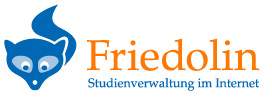| Name des Moduls | [117600] Quantum Optics | Bezeichnung des Moduls | PAFMO260 |
| Studiengang | [128] - Physik | ECTS Punkte | 4 |
| Arbeitsaufwand für Selbststudium | 75 | Häufigkeit des Angebotes (Modulturnus) | jedes 2. Semester (ab Sommersemester) |
| Arbeitsaufwand in Präsenzstunden | 45 | Dauer des Moduls | 1 |
| Arbeitsaufwand Summe (Workload) | 120 | ||
| Modul-Verantwortliche/r | Prof. Dr. T. Pertsch, Dr. F. Setzpfandt |
| Voraussetzung für die Vergabe von Leistungspunkten (Prüfungsform) | schriftliche oder mündliche Prüfung (100%) Prüfungsform wird zu Beginn des Semesters bekannt gegeben. |
| Empfohlene Literatur |
|
| Unterrichtssprache | Englisch |
| Voraussetzung für die Zulassung zum Modul | Keine |
| Empfohlene bzw. erwartete Vorkenntnisse | Grundkenntnisse Quantentheorie, Elektrodynamik, theoretische Optik |
| Art des Moduls (Pflicht-, Wahlpflicht- oder Wahlmodul) | 128 M.Sc. Physik Vertiefung „Optik”: Wahlpflichtmodul 628 M.Sc. Photonics: Wahlpflichtmodul |
| Zusammensetzung des Moduls / Lehrformen (V, Ü, S, Praktikum, …) | Vorlesung: 2 SWS Übung: 1 SWS |
| Inhalte |
|
| Lern- und Qualifikationsziele | The course will give a basic introduction into the theoretical description of quantized light and quantized light-matter interaction. The derived formalism is then used to examine the properties of quantized light and to understand a number of peculiar quantum optical effects. After active participation in the course, the students will be familiar with the basic concepts and phenomena of quantum optics and will be able to apply the derived formalism to other problems. |


